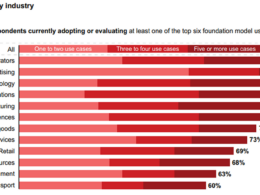health transformation
knowledge portal
Joaquim Cardoso MSc
Founder and Chief Research and Strategy Officer (CRSO) Editor in Chief
April 4, 2024
What is the message?
Generative artificial intelligence (AI) is poised to disrupt the careers of middle-class workers, posing challenges that require proactive responses from individuals, organizations, and policymakers.

This summary is based on the article “Generative AI is set to disrupt the careers of middle-class workers” published by the MIT Sloan School of Management on February 28, 2024.
What are the key points?
LinkedIn’s “Future of Work Report: AI at Work” highlights the impending impact of generative AI on job markets, with estimates suggesting that 55% of LinkedIn members’ jobs will be affected by AI adoption. Middle-class workers, traditionally employed in stable roles like librarianship, are particularly vulnerable to disruption.
MIT’s Climate Project presents a comprehensive framework for addressing climate change, encompassing six “climate missions” ranging from decarbonizing industries to inventing new policies and systems. Collaboration between academia, businesses, and policymakers is essential for implementing effective climate solutions.
Entrepreneur Kerry Twibell emphasizes the importance of navigating gender bias in professional environments, advocating for peer support systems, resilience, and effective self-promotion strategies.
What are the key statistics?
LinkedIn’s report indicates that U.S. communities with workers vulnerable to AI disruption are, on average, 10% above the median income.
The Climate Project at MIT aims to mobilize resources for climate action, recognizing the urgent need for transformative solutions.
Research suggests that while AI adoption may lead to job displacement in the long run, the immediate economic feasibility of automation remains limited, with only 23% of worker wages associated with vision tasks being economically attractive for automation.
What are the key examples?
Generative AI threatens the stability of roles traditionally held by middle-class workers, necessitating upskilling and adaptation to remain competitive in evolving job markets.
MIT’s Climate Project offers a strategic roadmap for combating climate change, underscoring the importance of interdisciplinary collaboration and innovative solutions.
Conclusion
As generative AI reshapes job markets, organizations, individuals, and policymakers must collaborate to mitigate disruptions and seize opportunities for innovation and growth.
Addressing climate change and fostering diversity and inclusion are critical imperatives in shaping a sustainable and equitable future amidst technological advancement.
To read the original publication, click here.











